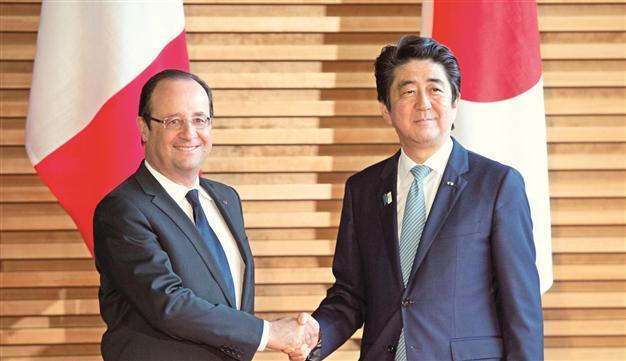Japan, France to enhance nuclear,defense relations
TOKYO - The Associated Press

France’s President Francois Hollande (L) and Japanese Prime Minister Shinzo Abe shake hands before attending a meeting at the prime minister’s official residence in Tokyo on June 7. AFP photo
Japan and France agreed on June 7 to deepen their cooperation on nuclear technology and to discuss joint development of military equipment, vowing to raise the tenor of their partnership.Visiting French President Francois Hollande and Japanese Prime Minister Shinzo Abe issued a joint statement pledging to prevent nuclear proliferation while raising safety standards for nuclear energy.
The two sides also agreed to establish a regular dialogue between their defense ministers that would include talks on cooperating in developing and managing exports of defense equipment. Japan has similar arrangements with the United States and Britain.
“This visit had a new ambience,” Hollande said after summit talks with Abe, pointing to closer security and political ties as evidence of a closer partnership.
Japan has expressed concern over French exports of equipment that potentially might have military uses to China, including the sale last year of equipment used to help helicopters land on ships. Providing China with such a capability alarms Tokyo given its tensions with Beijing over disputed islands in the East China Sea.
Hollande said he reiterated France’s insistence that the helicopters were not intended for military use. Asked about the strains between Japan and China, which the French president visited just weeks earlier, Hollande urged the two sides to pursue dialogue in resolving their disagreement and to above all observe international law.
Partnership in Turkey’s nuclear power plant
Japan’s Mitsubishi Heavy Industries and France’s Areva are cooperating on construction of a reactor in Turkey, and Abe is eager to promote further Japanese exports of atomic technology despite the disaster at Fukushima following the March 11, 2011, earthquake and tsunami.
A Japanese-French alliance led by Mitsubishi and France’s Areva will build Turkey’s second nuclear power plant, according to the deal. The agreement brings together Mitsubishi and Itochu to build the plant, which is to have a capacity of around 4,800 megawatts, with the main operator France’s GDF Suez.
The two leaders pledged a united front in fighting against proliferation of nuclear technology for non-peaceful means and in combating terrorism. Hollande praised Abe, meanwhile, for his efforts to end a long spell of deflation and revive Japan’s stagnant economy.
“This is good news for us,” he said. “If Japan succeeds, then France and Europe as a whole will benefit.”
But in a swipe at those who have been urging France and other European nations to abandon painful austerity programs in following Japan’s example of aggressive government spending and monetary policy, he said, “The conditions are different.”
“Each deciding what is best for their own country is what we must do,” Hollande said.
The two countries exchanged agreements on various joint projects, including nuclear fuel recycling and tourism promotion. Hollande’s three-day state visit ends on June 8.
















